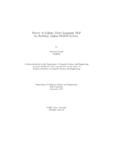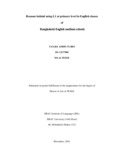Indigenous languages in Bangladesh & bilingualism: a qualitative study

View/Open
Date
2023-06Publisher
Brac UniversityAuthor
Sumayra, NusratMetadata
Show full item recordAbstract
Bangladesh is a country of various cultures. People from different cultures reside in Bangladesh. Language is one of the integral parts of culture. Without language a person would be incomplete. There are around forty-two established languages in our motherland. Among these languages, thirty-six languages are spoken by ethnic minority groups who are also known as indigenous people. The other six languages are known as non-ethnic minority languages.
This study explores Bangladeshi Indigenous Language and Bilingualism. People who can speak more than one language equally are known as bilingual. Its nature is interrelated with various fields such as anthropology, psychology, linguistics, and the field of communication. As bilingualism is a major part of my thesis paper, I explored bilingual people and their languages. Indigenous people are counted as bilingual because they can speak in two languages, and in this case one is their mother tongue (L1) and another is Bangla (L2). My focus was on how bilingual people acquire two languages at the same time, how proficient they are between L1 and L2 and why they are detached from their mother tongue.
The qualitative method is considered to be the most suitable method for this study as I tried to understand the phenomena in details by providing a rich detail.
For this research, I interviewed nine indigenous people who belong to different indigenous tribes. Among my participants, some of them are Garo, Chakma, Marma, Hajong etc. Mostly are universities students, few of them are service holders.
The output I have finally gotten is that most of my participants are almost detached from their mother tongue because of pursuing education in Bangla and English. Yet, they have a desire to work on their mother tongue so that their mother tongue can be sustained, spread and known worldwide. Because their languages are not used much outside their communities, their languages
are not valued in different aspects of lives. Therefore, these languages may be extinct in the future unless proper steps are taken to revive these languages. They want the government of Bangladesh to take initiative to protect their local language otherwise the next indigenous generation will probably lose their ancestors' mother tongue.
LC Subject Headings
Communication and culture--Bangladesh; Indigenous peoples--Bangladesh; Language acquisition; Bilingualism; Bangladesh--Languages; Ethnology--Bangladesh; Multicultural education--BangladeshDescription
This thesis is submitted in partial fulfillment of the requirements for the degree of Bachelor of Arts in English, 2023.Department
Department of English and Humanities, Brac UniversityType
ThesisCollections
- Thesis, B.A. (English) [649]
Related items
Showing items related by title, author, creator and subject.
-
Survey of Afghan (Dari) Language NLP for Building Afghan NLIDB System
Karimi, Sadullah (Brac University, 2022-09)Technology adoption is extremely limited in Afghanistan, especially since people have limited access to the Internet, smartphone, and computer due to power limitations and the high cost of the Internet. The people in ... -
Foreign language acquisition: a study on how people build the motivation to acquire Korean and Japanese languages through media in Bangladesh
Islam, Abidul (BRAC University, 2024-11)With the rise of the Internet, accessing another country's content has become much easier. Not only this, it has also made it possible to learn other languages. Japanese and Korean are two languages that have entered ... -
Reasons behind using L1 at primary level in English classes of Bangladeshi English medium schools
Turin, Tanjia Afrin (BRAC University, 2014-12)One of the on-going debates among language teachers especially primary level is whether or not to use students‟ First language (L1) in foreign language classrooms. In Bangladesh most of the teachers have been using Bangla ...



